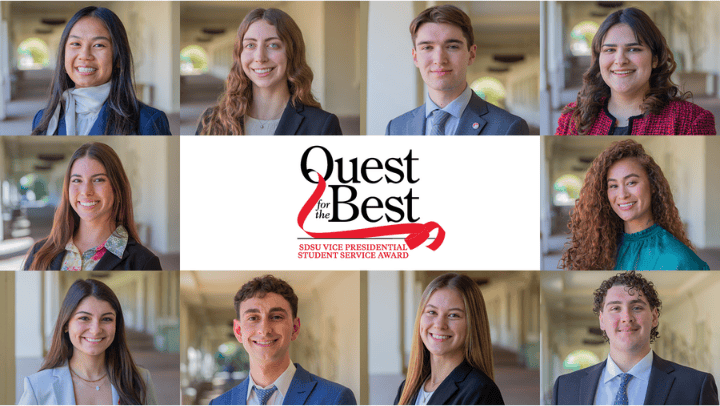Military Ally Program Working to Forge Connections
The program fosters understanding and dialogue between service members, veterans and the civilian population.

San Diego State University is nationally recognized for its large military presence and decades of service to student-veterans and military-affiliated students.“It’s about encouraging the conversations to happen so that we can see things from both perspectives.”
Building on this history, the Joan and Art Barron Veterans Center—which supports more than 3,200 military-affiliated students on campus—is expanding the reach of its Military Ally program to foster understanding and dialogue between service members, veterans and the civilian population.
“There is a division between the military community and the civilian community as a whole, and a lot of it has to do with fewer and fewer people serving. You don’t see the connection with American society to the military quite like you used to,” said Todd Kennedy (’16), SDSU’s Military and Veterans Program administrator.
The center is hosting four spring sessions for the Military Ally program, a resource that brings together military-affiliated and civilian students, faculty and staff for a 3-4-hour instructional program that includes learning and focused dialogue. The next session is scheduled for Friday, Feb. 23.
Getting to know you
Frida Gomez, an SDSU psychology major who is not affiliated with the military, completed a session of the Military Ally program last year. Gomez hopes to work as a clinical counselor on-base in the region and thought the program would be a great opportunity to get to know this unique student population.“I think the Military Ally program definitely helps with bridging that gap between our [military-affiliated] students and our civilian students so that we don’t feel intimidated to speak to one another,” said Gomez, who learned about Military Ally through the Aztec Mentor Program.
Citing programs like SafeZones, which encourages an inclusive environment for the LGBTQIA community, and the Brave Project, a training program on sexual violence, Gomez said the Military Ally program is an important addition to the campus dialogue.
“Even though these programs all talk about completely different communities, the impact they have on students is pretty amazing,” Gomez said.
Created in April 2015, the Military Ally program is the brainchild of Kennedy and Derek Abbey, the west region director for the Travis Manion Foundation. It was inspired by the development of the Vet Net Ally program created at California State University, Long Beach.
While the Vet Net Ally program focused primarily on veterans, Kennedy and Abbey hoped to create a resource for what they refer to as “military-affiliated” students, a group that includes not just veterans, active duty members and reservists, but also military dependents.
Different challenges
Military-affiliated students often face challenges that traditional college students may not, Kennedy noted.This population also faces popular misconceptions, such as that they all suffer from post-traumatic stress disorder and that every service member has seen combat.
“Conversely, from a service member’s standpoint, some of the things we hear are that they view civilians as lazy and inexperienced,” Kennedy said. “We do encourage service members, veterans, dependents and retirees to go through the program because those conversations also go in the other direction.”
Kennedy said dialogue can also help both groups to understand how the other has experienced different types of challenges and trauma in life. “It’s about encouraging the conversations to happen so that we can see things from both perspectives,” he said.
Kennedy emphasized that the Military Ally program isn’t training because they’re not there to teach. “All we do is provide information. Then we encourage questions and discussions to help break down some of those barriers to reintegrate our society as a whole.”
Military Ally sessions are scheduled for Feb. 23, March 7, April 27, and May 25, starting at 8:30 a.m. and ending around noon. You only need to complete one session to become an ally, and those with or without a military connections are encouraged to attend.
Upon completion of a full session of the Military Ally program, students will receive a branded lapel pin. Faculty and staff who complete the program will receive a Military Ally sign for their office, identifying them as a trustworthy resource for military-affiliated students.
For more information or to RSVP for the program, contact Todd Kennedy, the Military and Veterans Program administrator, at [email protected].



